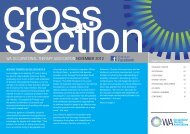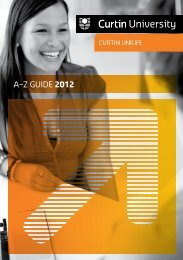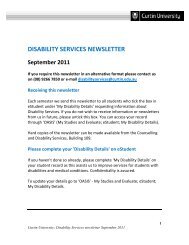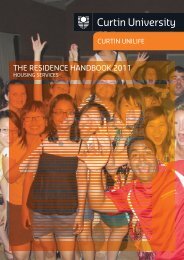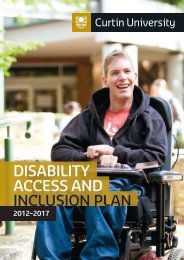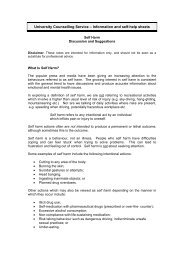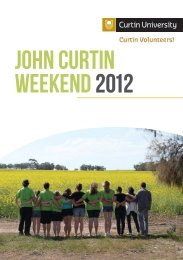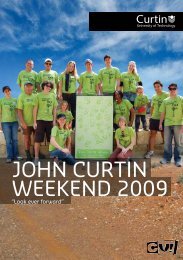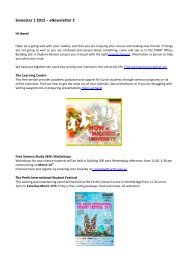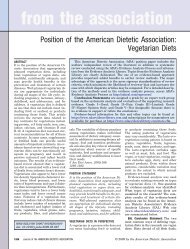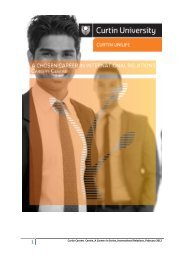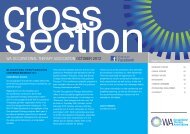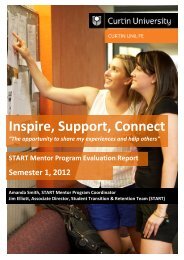UniPASS Report Semester 1 2012 - Unilife - Curtin University
UniPASS Report Semester 1 2012 - Unilife - Curtin University
UniPASS Report Semester 1 2012 - Unilife - Curtin University
You also want an ePaper? Increase the reach of your titles
YUMPU automatically turns print PDFs into web optimized ePapers that Google loves.
<strong>UniPASS</strong> <strong>Semester</strong> 1 <strong>2012</strong> <strong>Report</strong><br />
Benefits to the Student Experience and <strong>Curtin</strong>’s Reputation<br />
<strong>UniPASS</strong> has many benefits for the student experience and <strong>Curtin</strong> brand. The program has transition and social<br />
integration benefits that help by providing students with a peer network. A network of peers is an important<br />
element of support and socialisation for students transitioning to university and having such a group of friends can<br />
assist in reducing attrition. In this regard, <strong>UniPASS</strong> complements <strong>Curtin</strong>’s Mentor program and provides another<br />
avenue for building relationships between students. Such strong student support can be expected to encourage<br />
positive word of mouth promotion amongst students and their prospective student peers.<br />
The unique type of support that <strong>UniPASS</strong> offers clearly helps students succeed. This support can only add to <strong>Curtin</strong>’s<br />
reputation as a leading university. Parents and prospective students are placing increasing value on the level of<br />
support offered by universities. A comprehensive support program like <strong>UniPASS</strong> provides extra competitive<br />
incentive which marketing staff can utilise when engaged in recruiting new students, especially international<br />
students.<br />
Attendance<br />
The biggest challenge for <strong>UniPASS</strong> is gaining sufficient attendance. The <strong>University</strong> of Wollongong averages<br />
attendance rates of around 40% (PASS Accredited Supervisor Manual <strong>2012</strong>), whereas the <strong>Curtin</strong> average for regular<br />
attendees is 7% (Figure 1.). This means that 7% of students enrolled in <strong>UniPASS</strong> supported units attend five sessions<br />
or more - although is worth noting that <strong>UniPASS</strong> has attendance rates of up to 21% in some units (Figure 1).<br />
There are many factors that contribute to the attendance rate, some we can influence but many we cannot. The<br />
factors we can influence to some extent include: session times and timetabling; room location; awareness of the<br />
program and its benefits; and the method of student registration. All these factors have been addressed to maximise<br />
the attendance. For example, we choose the closest rooms available to tutorials and lectures; session times are<br />
planned around lecture and tutorial times; extra sessions are provided at the beginning of the semester to give<br />
students opportunity to attend; an extensive promotional strategy has been implemented to ensure student<br />
awareness, with 84% of students in supported units having heard of <strong>UniPASS</strong> (figure 3); registration is no longer<br />
required as it was an obstacle to students, instead students come on a ‘first in’ basis.<br />
The main factor beyond our control is probably that <strong>UniPASS</strong> is voluntary. The voluntary aspect of <strong>UniPASS</strong> is<br />
unlikely to change as it is an essential element of PASS accreditation (PASS Guidelines for Best Practice, <strong>2012</strong>) and<br />
the student numbers involved in a compulsory program would make the cost prohibitive. Other factors include:<br />
student culture; date of the first assessment; campus culture; cost of living in Perth – resulting in high hours of parttime<br />
work; unit contact hours; and in the future we anticipate that hourly paid parking will have a measureable<br />
negative effect on <strong>UniPASS</strong> attendance. One recommendation is that <strong>UniPASS</strong> develop a more comprehensive list of<br />
selection criteria for selecting units based on analysis of the results and data.<br />
Collaborative Peer learning is not yet a wide spread teaching style at <strong>Curtin</strong> and the program is still building up its<br />
reputation with students and staff. We anticipate that as the benefits of <strong>UniPASS</strong> become more widely known and a<br />
culture of peer learning starts to establish, the attendance rate will improve. Anecdotal evidence suggests that<br />
student word of mouth promotion of <strong>UniPASS</strong> is helping to build attendance over multiple semesters. Also, we have<br />
been contacted by several unit coordinators requesting <strong>UniPASS</strong> support for their unit.<br />
Raphael Pereira September <strong>2012</strong> UniLife – START – <strong>UniPASS</strong> 8



